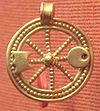Vosegus

Vosegus (Latin: [ˈwɔ.sɛ.ɡʊs]; sometimes Vosagus, Vosacius, Vosagō, Vosegō, Vogesus) was a name used in the Roman Empire for a Celtic god of hunting and forestation.[1]
Description and history[]
On the rare representations that have come down to us, Vosegus is represented with a bow and a shield, and he is sometimes accompanied by a dog.[2] He is also associated with a local hunting deity with a piglet under his arm, and sometimes associated with nuts, acorns, and pine cones.[3] The central area where Vosegus was worshiped was around the Donon. On top of a hill there was a temple dedicated to Vosegus.[4]
The name is derived from the Proto-Celtic *uɸo- (“sub-, under”) and *segos (“force, victory”).[5]
Later in Gallo-Roman religion, Vosegus was the patron god of the Vosges in eastern Gaul. His name is attested in about five inscriptions from western Germany and eastern France, twice in the form Vosego Silv(estri) and once as Merc(urio) Vos(ego).[6]
References[]
- ^ Geschichte zur frühen Besiedlung des Oberrheingrabens, Geological Institute of Albert-Ludwigs-Universität Freiburg (German)
- ^ "Gallo-Roman Exhibition at Langensoultzbach". Archived from the original on November 8, 2007.
- ^ MacKillop, James (2016). A dictionary of Celtic mythology. Oxford. ISBN 978-0-19-880484-0. OCLC 965737514.
- ^ Vosegus - A Gaulish god: The Sower
- ^ Urban, Michel Paul (March 9, 2010). La grande encyclopédie des lieux d'Alsace: toponymie, étymologie, histoire. Nuée bleue. ISBN 9782716507561 – via Google Books.
- ^ Nicole Jufer & Thierry Luginbühl. 2001. Les dieux gaulois : répertoire des noms de divinités celtiques connus par l'épigraphie, les textes antiques et la toponymie. Editions Errance, Paris.
- Gaulish gods
- Tutelary deities
- Mountain gods
- Celtic mythology stubs

